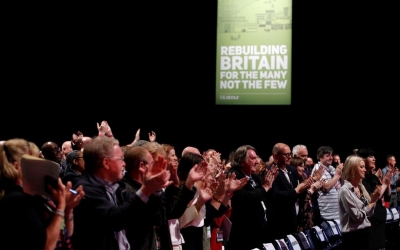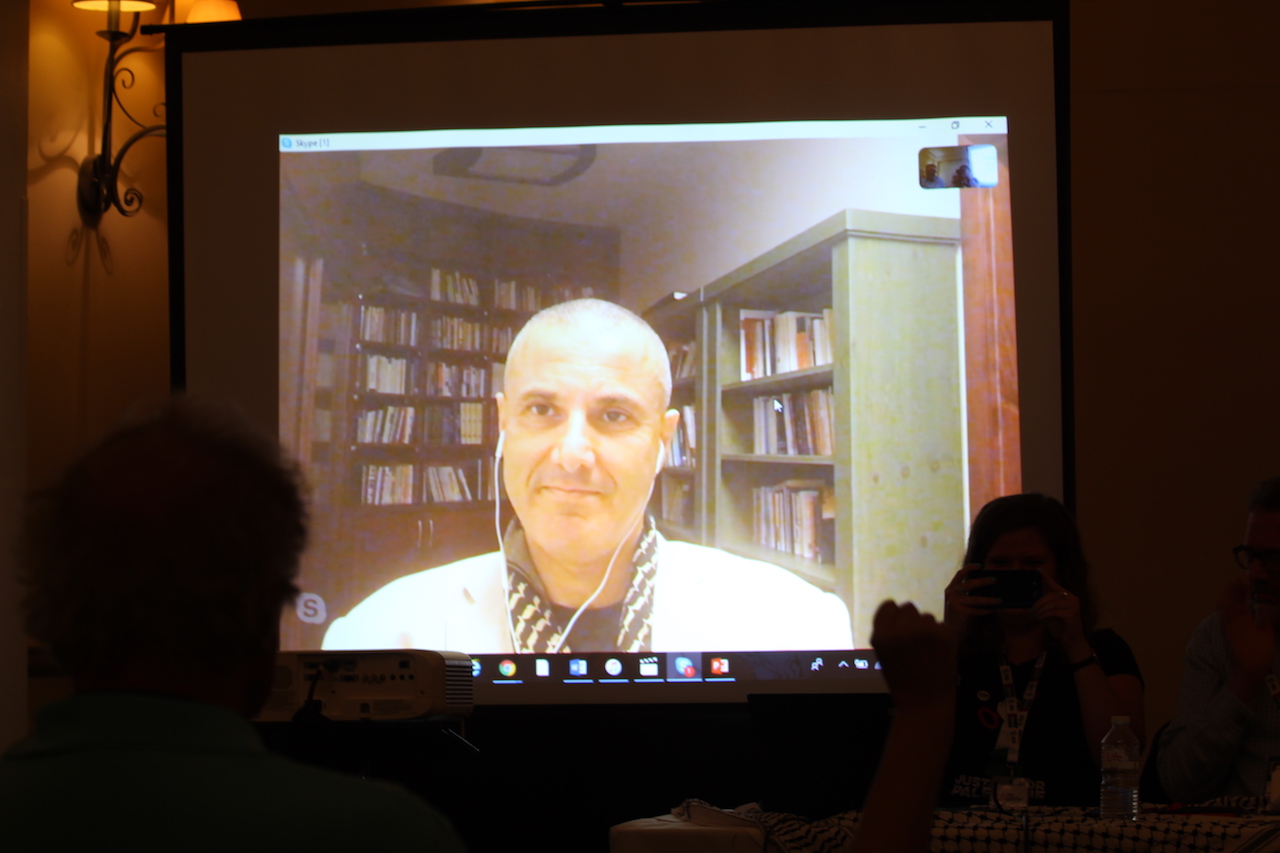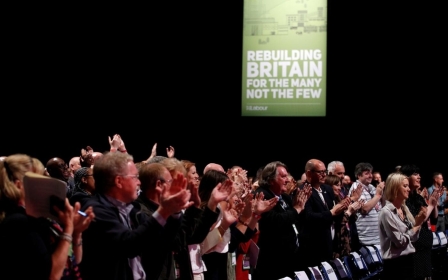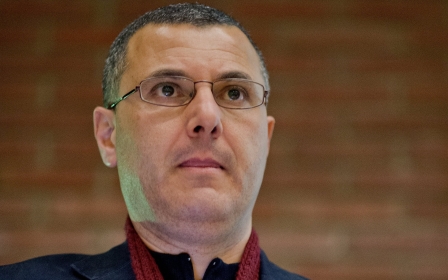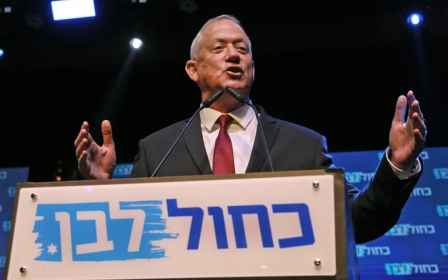Labour divisions over Israel-Palestine exposed at fractious party conference
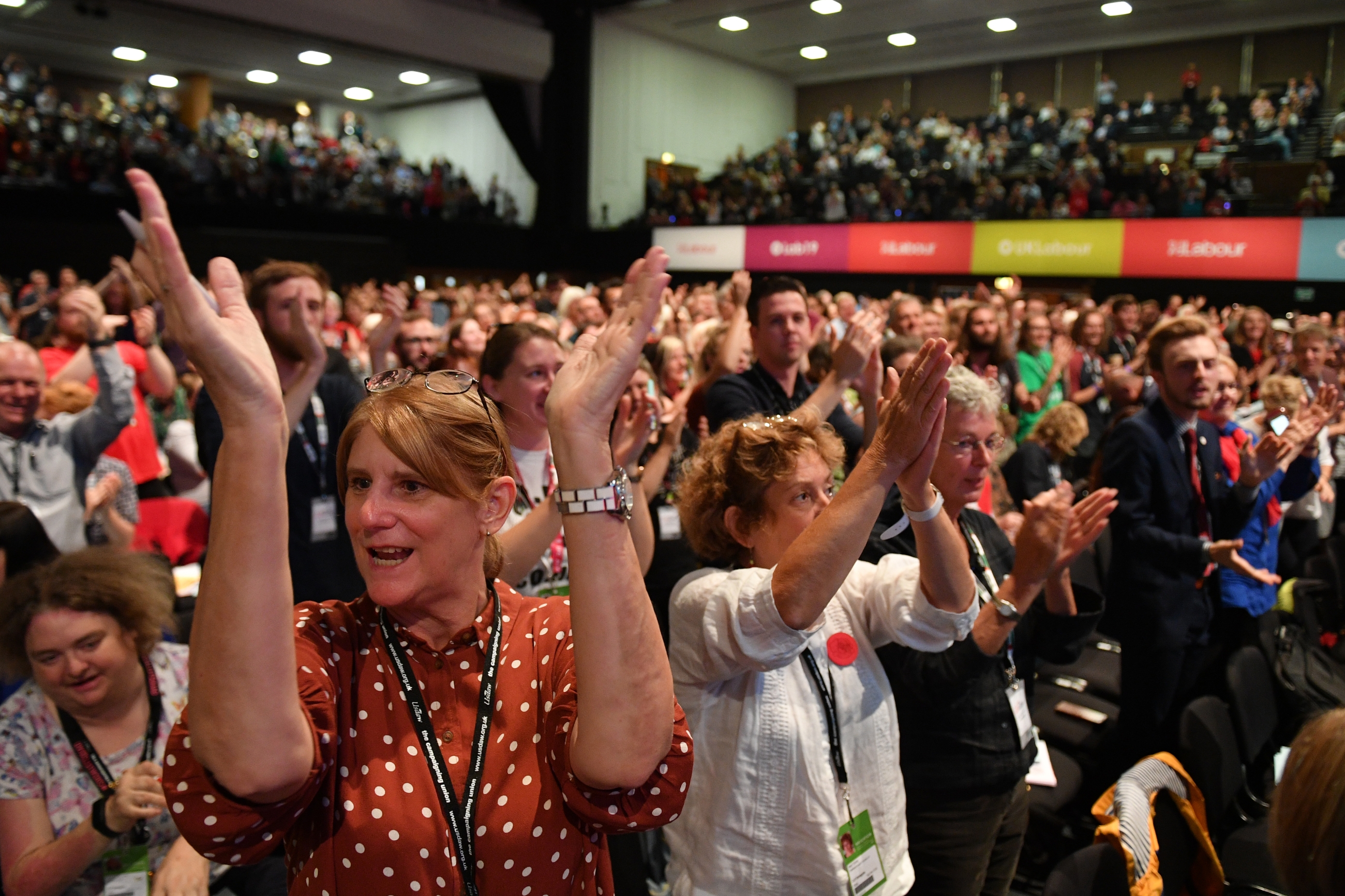
The British opposition Labour Party’s conference is currently taking place in Brighton with stark divisions laid bare within its ranks on a range of fractious issues, including its policies on Israel and Palestine and the rumbling saga of antisemitism accusations within the party.
En route to the conference along the south coast town's seafront, at least one local could be heard extolling the dangers posed by a party which, having slipped its ideological moorings under former prime minister Tony Blair's leadership, is no longer shy about burnishing its left-wing credentials.
“No freedom of speech, nothing!” he said. “When you have socialism, it’s only one step from there to communism!”
To which his friend asked: "So what is socialism?”
The array of stalls and events on hand at the party conference would leave a novice none the wiser as to the answer.
New MEE newsletter: Jerusalem Dispatch
Sign up to get the latest insights and analysis on Israel-Palestine, alongside Turkey Unpacked and other MEE newsletters
Alongside items sponsored by global banks stood others backed by the Communist Party of Britain's Morning Star newspaper and Sinn Fein, the main Irish republican party which seeks the creation of a united Ireland.
The World Transformed conference, which is taking place in parallel further down the road, featured activists imagining scenes of how a post-capitalist society might look that would presumably horrify some of the former management consultants among the party's current members of parliament.
While Britain's tumultuous exit (or lack thereof) from the European Union has dominated domestic press coverage, the similarly contentious question of Israel-Palestine has also set activists on edge.
In 2015, Labour members elected the then-66-year-old Jeremy Corbyn, a longtime backbencher and anti-war activist from the party’s left-wing, as leader.
The election of Corbyn, a man long known as the "foreign secretary of the left", blew apart British politics - not least because of his reputation as a staunch advocate of Palestinian rights.
Clear divisions
On Monday, delegates voted by a huge majority to support the right of Palestinian refugees to return to their homeland in Israel.
Delegates also for the first time backed a boycott of Israeli settlement goods and opposed trade deals with Israel which “fail to recognise the rights of the Palestinians”.
The issue has exposed clear divisions within the party. Outside the conference centre in Brighton, leaving aside the EU issue, it represented the clearest point of antagonism.
On the one hand were those who believe that the influx of activists into Labour's ranks since 2015 - a process that has given the party the most populous membership in Europe - has led to an infection of cranks and conspiracy theorists whose public opposition to Israel has tipped over into antisemitism.
The activists of the Jewish Labour Movement (JLM), a group more than a century old which traces its origins to the beginnings of the Labour Zionist tradition that later spawned Israel's founder David Ben Gurion, have been amongst the most overt critics of Corbyn's leadership.
Outside the conference hall, the JLM advertised an afternoon rally on Sunday bringing together a number of Corbyn's fiercest critics, including Margaret Hodge, a longtime opponent who referred to him as a "fucking antisemite" in 2018.
“Come to the Jewish Labour Movement rally," said one of the activists as they handed out a leaflet.
“Is it an open event?”
“No, you have to book ahead,” said the activist.
“Is it still possible to do that?”
“No, it’s fully booked,” she said.
At which point the leaflet was handed back.
On the other end of the issue, politically, are those who view the JLM and their allies as apologists for Israel's repression of the Palestinians.
Jewish Voice for Labour, a group founded in 2017 by supporters of Corbyn, also found their main event packed to capacity.
Hosting pro-Palestinian Israeli historian Ilan Pappe and former Palestinian member of the Israeli Knesset Haneen Zoabi, the event spilled out of a hotel conference room hastily changed from one end of Brighton to another as demand increased.
"Jews played a proud role in fighting South African apartheid, opposing [Chilean dictator] Pinochet, supporting the Freedom Riders in the US south," said Pappe.
"In the same way they oppose the oppression of Palestinians by the Zionist Israeli state. They weren't antisemites then, they are not antisemites now."
Cartoon controversy
But there was little chance of avoiding controversy. In particular, police were called to take down a banner outside the main conference hall displaying a cartoon by the Brazilian cartoonist Carlos Latuff depicting Israeli Prime Minister Benjamin Netanyahu attacking Corbyn with rockets marked with the word "defamation" as he shouts "antisemite".
On Twitter, Corbyn - who has previously faced similar allegations - said he was "disgusted" and denounced the cartoon as "antisemitic poison," only to be attacked in turn by Latuff who accused him of having "bowed down to your detractors".
Elsewhere in the conference there were leaflets distributed headed "Labour Against Zionist Islamophobic Racism" which featured an image of a laser destroying the Jewish Labour Movement.
However, the allegations of antisemitism within Labour have led to a rash of expulsions in recent years - many of which have provoked a severe backlash from activists.
The most prominent Labour member to be suspended is arguably former London mayor Ken Livingstone, but the suspension of activist Jackie Walker and Derby North MP Chris Williamson have also been highly contentious.
Labour Against the Witchhunt, a group supposedly sponsored by among others comedian Alexei Sayle and filmmaker Ken Loach, had stalls prominently on display outside the conference denouncing the expulsion of the Labour activists and calling for "free speech".
An event organised by the Palestine Solidarity Campaign (PSC) saw a similarly packed attendance as the JVL event, not least as it was set to feature an appearance by Omar Barghouti, co-founder of the Boycott, Divestment and Sanctions (BDS) movement that has been a bete noire of Israel supporters since its launch in 2005.
'BDS targets complicity - not identity'
Barghouti had originally been set to appear in person, but the UK Home Office did not distribute a visa in time, which he derided as McCarthyism and a denial of free speech in spite of denials by Home Office officials.
Speaking via Skype, Barghouti received a standing ovation from attendees as he called for Israel to be held to account for its violations of international law.
He also stressed the BDS movement's principled opposition to racism and bigotry in all forms - including antisemitism.
“BDS has consistently and categorically opposed all forms of racism and discrimination, including antisemitism, Islamophobia, anti-black racism, sexism, and anti-LGBTQ discrimination," he said, speaking from the West Bank city of Ramallah.
"BDS targets complicity - not identity."
Lisa Nandy, a Labour member of parliament, while stating her opposition to BDS, said she had been pressured not to attend the PSC event due to the presence of Barghouti, but would not be cowed.
“How can it possibly be right to argue that we cannot debate these issues when Netanyahu’s settlers are creating, in reality, one state on the ground and when the President of the US is supporting him?” she said.
“If Donald Trump has a right to speak, then the Palestinian people have a right to speak.”
Shortly before the PSC event began, one other attendee expressed her disappointment at being unable to attend the JVL event.
"I really wanted to see Chris Williamson - I feel that he's really on it!"
The tension at the party conference was undeniably palpable and the issue of Palestine - which last year saw the conference swamped in Palestinian flags as the party voted to block arms sales to Israel - continues to be one of the most contentious issues.
For some the issue is a matter of "freedom of speech", with a fearful party machine and other belligerents seeking to prevent - Communist-style, as the local Brightonian feared - an open discussion on Zionism, Israel-Palestine and BDS.
For others, it's a question of whether the party is still an accepting place for Jews and supporters of Israel, with a membership becoming increasingly anti-Zionist.
But ultimately these issues - like most issues - were overshadowed for the majority (and will continue to be) by the most omnipresent of issues: Brexit.
Middle East Eye delivers independent and unrivalled coverage and analysis of the Middle East, North Africa and beyond. To learn more about republishing this content and the associated fees, please fill out this form. More about MEE can be found here.


